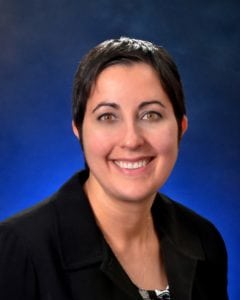Every year at Passover, we recite the biblical words, “My father was a wandering Aramean,” recalling our history as a people that has been forced out of our homeland more times than we can count, seeking refuge and mercy in other countries only to find ourselves fleeing toward safety and freedom a few years later.
On September 23, we celebrated Sukkot, remembering the decades-long journey through the desert and the wilderness, with uncertain supplies of food and water, and the temporary shelters (sukkot) that we built. One outcome of these rituals and holidays is the still resonant memory of our identity as a nation of immigrants and refugees, displaced and in exile, which, in Hebrew, we call galut.
For many of us, this story reflects those of our parents and grandparents, many of whom fled Europe due to pogroms, poverty, discrimination and the coming of the Holocaust.
For Jewish Hospital, this story is at the core of our founding. The hospital was established in 1903 for Jewish patients who could not get care elsewhere (either for religious or financial reasons) as well as for Jewish doctors who could not practice anywhere else.
Jewish Hospital continued this legacy of justice and access for all people by being the first racially integrated hospital in the area, welcoming African-American physicians to practice when other hospitals did not. This commitment to inclusion and advocacy is also at the heart of other Jewish organizations in this city, such as Jewish Family & Career Services (JFCS), as well as in our country, such as the Religious Action Center (RAC), the Hebrew Immigrant Aid Society (HIAS).
Few people realize that Louisville is a major immigrant resettlement center, in large part thanks to the culture of inclusion that Jews here have worked to foster. I believe that JFCS’ annual MOSAIC awards, along with its career and immigrant services have also changed perceptions in our city, helping to create a culture that celebrates diversity.
Jewish Hospital has also played a pivotal role with its diverse staff and its efforts to support them in a variety of ways. Jewish Hospital and Saint Mary’s Foundation’s Adath Jeshurun’s Pikuach Nefesh Fund is one example of how we have partnered with the Jewish community to help our employees who came to this country as refugees. We helped one employee reunite with his wife and two children from South Sudan less than a year ago.
Jewish Hospital is proud of its legacy of welcome and inclusion. In recent years, we have been blessed with the ability to keep this legacy alive through our partnership with Kentucky Refugee Ministries (KRM), hiring recent refugees and immigrants, many of whom worked in health care in their home countries or in refugee camps.
KRM was founded in 1990 by Donna Craig, who led the agency until 2000. Craig established a service model for KRM that placed central emphasis on the involvement of community members partnering with the agency to welcome newly arrived refugee families and support its mission and operations.
Craig died in 2012, but KRM has continued to honor her vision by awarding the Donna Craig Volunteer Service Award at its annual Global Gourmet fundraiser. On September 21, Jewish Hospital received the award in recognition of its championing of employment opportunities for refugees.
Amid change and transition, Jewish Hospital continues to fulfill its founding mission and to serve as a light to others who are struggling. This is precisely the legacy that we have inherited, and the essence of the festival of Sukkot. Even though we may wander through the wilderness, facing an uncertain future, we journey forward with faith in our hearts and a commitment to justice and mercy for all people.
(Rabbi Nadia Siritsky is vice president of mission for KentuckyOne Health.)




